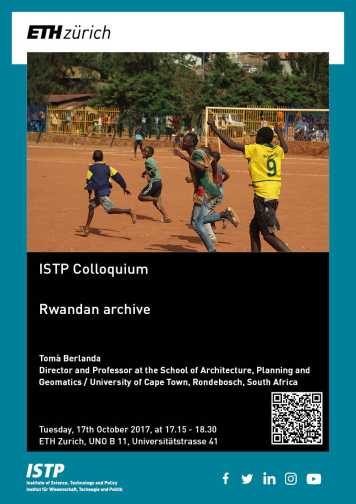Colloquium: Tomà Berlanda
Tuesday, 17th October 2017, at 17.15 - 18.30
ETH Zurich, UNO B 11, Universitätstrasse 41
Rwandan archive

Unlike other African capitals, Kigali has not been established as a city by a colonial power. Even though it was founded under German rule, it became capital only after Rwanda’s independence from Belgium in 1962, and until 1994 remained relatively small.
From the end of the 80’s onwards, though, following the introduction of the structural adjustment plans, urbanisation has become an intentional strategic goal of government policies, and, together with land tenure regularisation and the growth of private led industrialisation, has had a huge impact in the re-design of the entire territory. In official documents this transformation is considered a goal to be pursued and encouraged through the reorganization of agricultural activities, the concentration of investments in urban centres, the adoption of measures aimed at moving and grouping population.
What is visible today is a territorial imbalance in growth between the capital city and the rest of the country, an indication of both global phenomena and local circumstances. Furthermore, it highlights the need to consider Kigali’s evolution in close connection to all that of the Rwandese countryside. Not only because of the migration of population, but also because the establishment of a “competitive city in the global market” such as it is conceived and pursued today, requires massive investments and resources.
The conversation is the result of a four year (2011-2014) professional, scholarly and educational architecture project in Rwanda, and intends to locate the particular conditions of the country, its rural settlements and communities, within the larger role that architecture can play in the building of society in a sub-Saharan African country.
About Tomà Berlanda
Born in Venice, Tomà Berlanda is an architect and scholar with extensive international academic and professional experience. As of April 2015, he is Professor of Architecture and Director of the School of Architecture, Planning and Geomatics at the University of Cape Town. In this capacity, he pursues his research interests focusing on the implications that can be drawn from a non stereotypical reading of the African city and the practice of architecture in non-Western urban settings and landscapes. This follows upon his position as co-founder of asa studio in Kigali (2012-14), where he led an extensive design and build campaign to provide community based early childhood and health facilities across Rwanda. The award winning work, recently recognised with the Curry Stone Social Design Impact Circle, has been published widely, and included in the Afritecture: Building Social Change (2013) and the Africa: Architecture, Culture and identity (2015) exhibitions.
Prior to UCT, he has held teaching positions at various other institutions, including Syracuse University (2009-10), Cornell University (2012) and the Kigali Institute of Science and Technology (2011-3). He holds a Diploma in architecture from the Accademia di architettura in Mendrisio, Swtizerland (2002) and a Ph.D in Architecture and Building design from the Politecnico di Torino, Italy (2009). He is the author of "Architectural Topographies" (Routledge, 2014), as well as a number of articles and chapters in international publications.
You can read a Summary of the talk on ISTP News